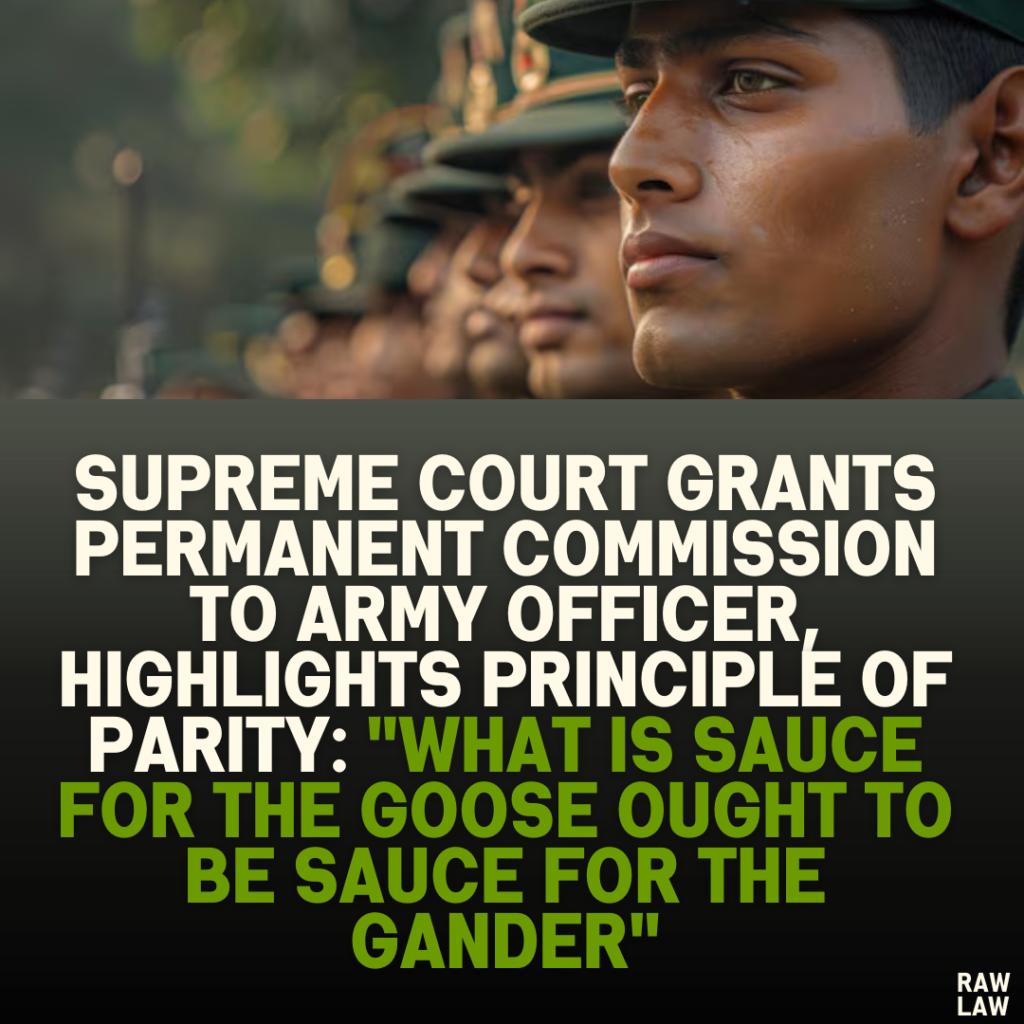Court’s Decision
The Supreme Court of India allowed the appeal, holding that the appellant was entitled to parity with other similarly situated officers who were granted permanent commission by the Armed Forces Tribunal (AFT) Principal Bench in 2013. The Court directed the grant of permanent commission to the appellant, with retrospective effect from the same date as the other officers, along with all consequential benefits, including seniority, promotion, and monetary arrears, to be implemented within four weeks.
Facts of the Case
- Background of the Appellant’s Service:
The appellant was commissioned as a Short Service Commissioned Officer (SSC) in the Army Dental Corps in 2008. At the time, regulations provided three opportunities to take the departmental examination for permanent commission, with provisions for age relaxation. - Missed Opportunities:
- The appellant attempted the examination twice but was unable to qualify.
- Her third opportunity was due in 2013. However, amendments to the relevant policy introduced on March 20, 2013, disallowed the third attempt by capping the age limit and removing specific provisions for relaxation.
- Impact of Amendments:
The new policy restricted age relaxation to candidates with specific qualifications, which excluded the appellant. As a result, she was deprived of her third chance. - Relief Granted to Others:
- Several similarly situated officers, affected by the same amendments, approached the AFT Principal Bench in O.A. No. 111 of 2013 and secured relief, including age relaxation and consideration for permanent commission under the earlier policy.
- The appellant, however, could not join the litigation due to her advanced stage of pregnancy and subsequent maternity leave.
- Appellant’s Representations and Legal Actions:
- The appellant’s representation in 2014, requesting similar benefits, was rejected on the ground that the relief was granted “only to the petitioners.”
- Subsequent representations were also dismissed. She later approached the AFT Regional Bench, Lucknow, which dismissed her claim on similar grounds.
Issues for Determination
- Was the appellant discriminated against by being excluded from the benefits granted to similarly situated officers?
- Did the amendments to the policy unfairly deprive the appellant of her third chance to secure permanent commission?
Petitioner’s Arguments
- Parity with Similarly Situated Officers:
The appellant argued that she was identically situated to the officers who had succeeded before the AFT Principal Bench in 2013 and was entitled to similar relief. - Discrimination:
She contended that denying her the opportunity to appear for the third attempt violated principles of equality and non-discrimination. - Unjustified Denial:
The appellant emphasized that the refusal to grant her relief was arbitrary, particularly when the AFT Principal Bench had not expressly restricted its ruling to the petitioners in the earlier case.
Respondent’s Arguments
- Limitation of Relief:
The respondents argued that the AFT Principal Bench’s judgment granted relief only to the petitioners involved in that specific case and could not be extended to others. - Compliance with Amendments:
They contended that the appellant did not meet the eligibility criteria under the amended policy and was, therefore, not entitled to the benefits.
Analysis of the Law
The Court analyzed the principles of equality and non-discrimination in service matters, emphasizing that similarly situated individuals are entitled to equal treatment unless there is a valid justification for differential treatment. The Court relied on established precedents:
- Amrit Lal Berry v. Collector of Central Excise, (1975) 4 SCC 714:
The principle laid down is that once a declaration of law is obtained, all similarly situated individuals should be extended the benefit without requiring them to approach the court individually. - K.I. Shephard v. Union of India, (1987) 4 SCC 431:
It was held that individuals similarly placed cannot be penalized for not litigating, and relief granted to one set of individuals must extend to all similarly situated persons. - State of Maharashtra v. Chandrakant Kulkarni, (1981) 4 SCC 130:
The Court distinguished this case, which dealt with the mere reduction of chances for consideration, from the present case that involved clear discrimination against the appellant.
Precedent Analysis
The Court referred to the AFT Principal Bench’s decision in O.A. No. 111 of 2013, which granted relief to officers who were eligible for a third attempt under the old policy but became ineligible due to the amendments. The Court highlighted that the ruling applied to officers identically situated with the appellant, reinforcing her claim for parity.
Court’s Reasoning
- Unfair Exclusion:
The Court observed that excluding the appellant from consideration when others in identical circumstances were granted relief amounted to arbitrary discrimination. - Principle of Parity:
The Court emphasized that denying relief to the appellant solely because she was not a petitioner in the earlier case would create an unjust scenario. It noted that the respondents failed to provide any valid justification for treating the appellant differently. - Exceptional Circumstances:
The Court considered the appellant’s continuous service, her distinguished career, and the challenges she faced, including her maternity leave, which prevented her from joining the earlier litigation. - Use of Article 142:
Exercising its powers under Article 142 of the Constitution, the Court granted permanent commission to the appellant, ensuring complete justice in the case.
Conclusion
The Court directed:
- The appellant to be granted permanent commission with effect from the same date as other similarly situated officers.
- All consequential benefits, including seniority, promotions, and monetary arrears, to be provided within four weeks.
- The order of the AFT Regional Bench, Lucknow, was quashed.
Implications
This judgment underscores the importance of fairness and equality in service-related decisions. It reaffirms the principle that judicial relief granted to one set of individuals must be extended to all similarly situated persons unless explicitly restricted. The ruling also highlights the judiciary’s role in addressing systemic discrimination and ensuring justice in exceptional cases.
